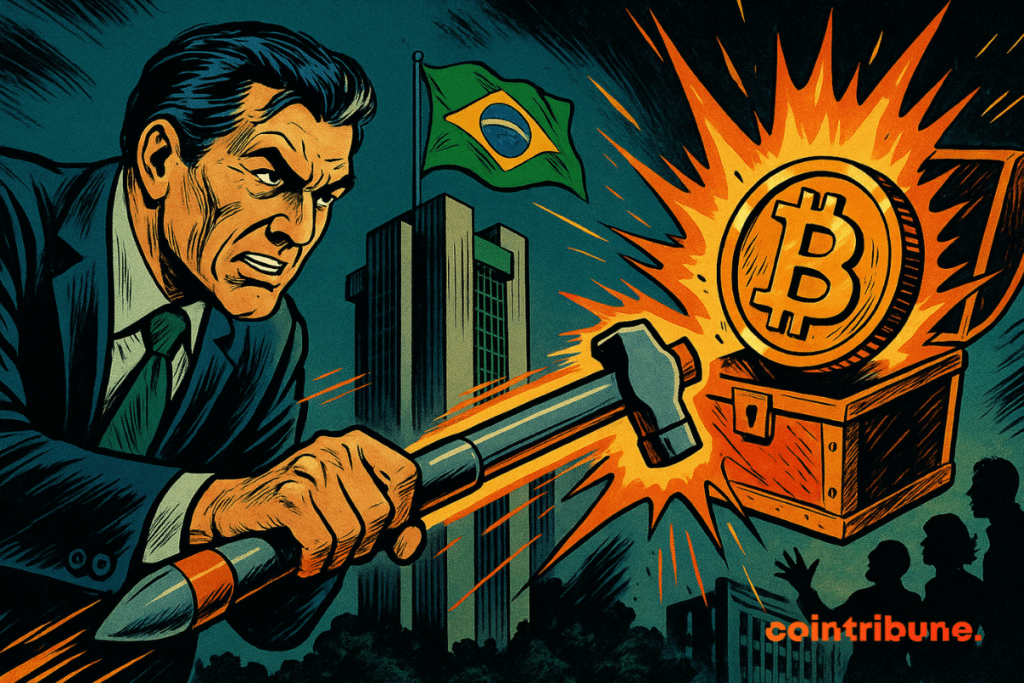Brazil’s Central Bank Rejects Bitcoin for National Reserves—Citing Extreme Volatility Risks
Brazil's monetary authorities just drew a hard line in the sand—no bitcoin in the national vaults.
The Reason? Pure Risk.
Central bankers flagged crypto's notorious price swings as a deal-breaker for reserve assets. They're sticking with traditional holdings—dollars, euros, and gold—to keep the country's financial backbone rock-solid.
It’s a classic move: old-school finance dismissing digital gold as too wild for the big leagues. Because nothing says 'stable' like a currency that can swing 10% before lunch.
So while crypto evangelists preach decentralization, Brazil’s playing it safe—proving that when real money’s on the line, volatility still rules the game.

In brief
- Brazil plans to invest up to 18.6 billion dollars of reserves in bitcoin.
- The Central Bank warns of risks and refuses to consider bitcoin as a reserve asset.
- A 17.5% tax on crypto gains mainly impacts small local investors.
- In 2024, the country ranked 10th worldwide for crypto adoption, with a trading volume of 76 billion dollars.
Cold war in Brasilia: the Central Bank locks down the Bitcoin dream
It’s a showdown like Brazil hasn’t seen in a long time in the financial sector, fueled by a will to end the dollar and redraw its monetary sovereignty. The Central Bank has brought out the heavy artillery against the bitcoin reserve project. Luís Guilherme Siciliano, director of international reserves, expressed his firm opposition to the project. According to him, bitcoin does not meet standards of a reserve asset. He relied on the IMF classification, which categorizes BTC among “non-financial and non-produced” assets, alongside natural resources like land or minerals.
On the other hand, some government members see a bold turn to take. Pedro Giocondo Guerra, Chief of Staff to the Vice President, defends this view with a clear and sharp quote:
Discussing the creation of a sovereign Bitcoin reserve is a public interest and vital for Brazil’s prosperity. After all, bitcoin is digital gold, the Gold of the internet.
Two camps, two worldviews. One bets on monetary caution, the other on economic disruption. Who will have the last word in this balancing act between tradition and modernity?
Crypto taxed, crypto valued: a strategy that makes some cough
Tax with one hand, invest with the other: a strategy that makes more than one in the crypto community cough. Since June, Brazil applies a uniform 17.5% tax on all capital gains linked to cryptocurrencies. No more exemption thresholds. Small investors pay the high price, even as the country considers injecting up to 18.6 billion $ of its reserves in bitcoin.
BTCUSD chart by TradingViewA contradiction? For some, yes. This fiscal turn, intended to replenish State coffers, sends a mixed message to those who believe in blockchain innovation. Why tax heavily an asset that one simultaneously plans to make a strategic pillar of public finance?
Tax pressure could cool local enthusiasm. And it doesn’t go unnoticed. On forums and X, several members of the Brazilian crypto sphere accuse the government of double-dealing: “They want the gains, not the vision.” A phrase that sums up the current ambivalence between digital dream and fiscal need.
When Brazil flirts with the giants
This is no small thing: Brazil is today the 10th country worldwide for crypto adoption and first in Latin America. In 2024, 76 billion dollars were traded in crypto in the country. Bill 4501/2024, nicknamed RESBit, aims to allow the Central Bank to buy up to 5% of its foreign exchange reserves, or around 19 billion dollars, in bitcoin.
And this is not an idea thrown into the air. On August 20, a first public hearing gathered representatives from the Central Bank, Ministry of Finance, fintechs like Bitso, and actors from the ABcripto association. Objective: debate the technical and political outlines of the project.
Focus on the key figures:
- 76 billion $ traded in crypto in Brazil in 2024;
- 10th worldwide country in crypto adoption;
- RESBit project estimated at 18.6 billion $;
- Parliamentary hearing held on August 20, 2025;
- 6 major institutions invited to the debate.
Brazil clearly flirts with a pioneering role. But in wanting to follow in the footsteps of El Salvador or the USA, the risk is great. Strategic headlong rush or giant leap towards the future? The lines remain blurred.
If Brazil is groping, it is not alone. In the United States, the idea of a bitcoin reserve is not consensual either. In Arizona, Governor Katie Hobbs rejected a similar proposal three times, the last one involving a reserve built from seized bitcoins. This shows that even in technophile strongholds, states remain divided on the role of crypto in their economic strategy.
Maximize your Cointribune experience with our "Read to Earn" program! For every article you read, earn points and access exclusive rewards. Sign up now and start earning benefits.

